#Jane Austen meta
Explore tagged Tumblr posts
Text
#!!!!! this is why she shows you WHERE her heroine is going to live! #in almost every case #anyway of course the love and romance and finding a partner is directly connected to finding a happy home. to making one! should be anyway (via itspileofgoodthings)
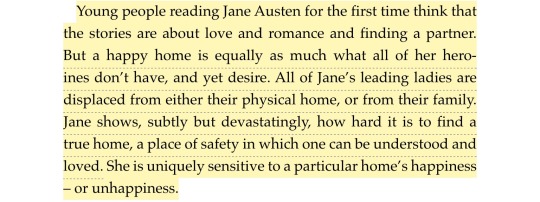
Reading Jane Austen at Home by Lucy Worsley and this passage got me.
4K notes
·
View notes
Note
Ok, I've been thinking about this question a lot and there's not enough evidence in P&P to fully support any answer, but I wanted to hear yours: What is the Gardiners' economic status/How rich are the Gardiners?
Obviously, Mr. Gardiner is a tradesman, but I'm desperately curious to know the extent of his wealth. Does he have a similar income to Mr. Bennet but is just more frugal? Would he have been able to take in his niece(s)/sister when Mr. Bennet died? Does he have Bingley-level tradesman wealth without the massive lump sum Bingley inherited from his father? Darcy assumes that Mr. and Mrs. Gardiner are gentry - but like, Bennet gentry or Woodhouse gentry or Lucas gentry. JANE SKIMPED ON THE GARDINER INFORMATION AND NOW WE'LL NEVER KNOW. So what are your headcanons surrounding the Gardiners' wealth?
Really, the most important Gardiner headcanon that the Gardiner children are immediately charmed by Darcy and think he's like ~the coolest~
thanks queen <3
Six months later: hi!
My opinion is that the Gardiners are very well-off in terms of the usual incomes of the gentry. It's difficult to pin down an exact income range because I'm not a historian or economist, but the literary evidence is pretty suggestive IMO.
For one, Mr Bennet has no trouble believing that Mr Gardiner could have shelled out ten thousand pounds for Lydia; the problem is the struggle of repaying him, as Mr Bennet would feel morally obligated to do. The impression I get is that this would be a lot of money for Mr Gardiner to come up with, but everyone accepts that he could quickly do it, where Mr Bennet could not. And Mrs Gardiner does insist that Mr Gardiner would have paid the money if Darcy had let him, which again suggests that it was reasonably doable for him.
When Elizabeth and Jane first pass the news to Mrs Bennet and try to express the debt of gratitude they all owe Mr Gardiner, Mrs Bennet's response is a bitter remark about how if her brother had not married and had children of his own, "I and my children must have had all his money, you know; and it is the first time we have ever had anything from him except a few presents."
Aside from what this reveals about her character (especially given the remarkable understatement of "a few presents" given everything they've done for Jane and Elizabeth), I think "all his money" suggests an awareness that there would have been quite a bit to inherit if Mr Gardiner hadn't had the temerity to, uh, have children.
The summer tourism journey also doesn't seem to represent a severe expense for the Gardiners, though it would be outside the realm of possibility for some. They're not super frugal, but they're also not going to pull a Sir William Lucas and abandon the source of their income, or take an estate or something to distance themselves from trade, and end up unable to provide security for their children or any significant luxuries for their loved ones and themselves. So the Gardiners do make practical decisions like living near Mr Gardiner's warehouses and continuing his business in town.
Darcy (in Elizabeth's opinion) mistakes the Gardiners for "people of fashion" rather than gentry per se. This is interesting because Darcy originally considered the entire Meryton neighborhood, including the local gentry, as people noticeably not of fashion. This concept of people of fashion is typically more about fashionable high society than trade vs gentry IMO.
For instance, Mr Hurst is described as "a man of more fashion than fortune"—i.e. someone with high society credentials from his family, but not a lot of money, though he has enough to maintain a house in Grosvenor Street. (I think the implication is that the Hursts considered their status and Louisa Bingley's 20,000 l. from trade a fair exchange.) So likely, Darcy is not confusing the Gardiners for minor rural gentry, but even higher-status people if Elizabeth is analyzing his reaction correctly, based on their appearance, apparel, demeanor, etc.
This is definitely a time when wealthy people in trade could pass for people of fashion, but I think it would ordinarily take some doing, and though the Gardiners are stylish and relatively young, they aren't trying hard in the way that the Bingleys are. Yet Darcy, who went on a whole tangent about trade cooties during his proposal, can't even identify the Gardiners as people in trade upon meeting them—that's important.
(It's also significant, of course, that he's surprised to discover their exact connection aka that they're Mrs Bennet's relatives, which is honestly pretty fair. In any case, he evaluates Mr and Mrs Gardiner on their own considerable merits by this point.)
So again, I get the sense that the Gardiners are quite well-off people who spend their money on nice enough things that they can be mistaken for a completely different class than their own, but are not specifically aiming for that or super extravagant, either. Their habits seem rather similar to Darcy's, actually—I don't think they're anywhere near as wealthy, but they're wealthy enough that they can approach major expenditures fairly casually, as he does. But unlike Darcy, it will always be contingent on Mr Gardiner's business success and they have to plan around his work and the possibility of sudden changes in terms of his work.
I personally think that Mr Gardiner would undoubtedly have been able to take care of his sister and nieces in the worst case scenario. Six women used to a high standard of living (we know Mrs Bennet is extravagant; it's only Mr Bennet's frugality that keeps the Bennets out of debt as it is) would probably be a strain, but I don't think beyond the income level indicated, even accounting for the needs of his immediate family.
When Mrs Bennet is dramatizing herself during the Lydia disaster, she tells Mr Gardiner, "if you are not kind to us, brother, I do not know what we shall do," and he assures her of his affection for both her and her entire family. This could be seen as a sort of empty redirection that avoids promising anything, especially given that her catastrophizing fantasy scenarios are extremely unlikely, but I think that's a misread of his character.
I see his reply as a tactful assurance that, in the (improbable) event of Mr Bennet dying in a duel, his affection for her and her daughters would indeed ensure his protection of her and her daughters. There's no doubt from anyone that he's capable of doing this, though it would certainly mean a change in their style of living that Mrs Bennet would vocally resent.
So while this isn't super-specific, I hope it helped!
Normally I don't need to do this, but I would like to add a sort of credit/disclaimer: I didn't initially notice all these signs and my understanding of the Gardiners' standard of living and general circumstances was, I believe, strongly influenced by JulieW of the Life and Times board at Republic of Pemberley back in the earlyish 2000s (maybe about 2006?).
The L&T board is sadly gone (or was the last few times I checked), though ROP clings to life, but she knew a lot more about Georgian history and culture than I ever will, and these references to the Gardiners' prosperity seemed really glaring once she pointed them out.
(Her analysis of Pemberley's age, architecture, and general class significance was also really influential and I'm still really sad that I have to rely on the perfidy of memory about it.)
#rop was not really a natural home for me but l&t was SO good ;_;#treesthatarepeachy#respuestas#edward gardiner#m gardiner#mr bennet#mrs bennet#pride and prejudice#jane austen#anghraine's meta#long post#nice things people say to me#fitzwilliam darcy
236 notes
·
View notes
Text
Jason Todd had to be resurrected in 2005.
He’d already missed the 1995 Jennifer Ehle/Colin Firth Pride and Prejudice, no way was he going to miss the 2005 Kiera Knightley/Matthew Macfadyen film.
#batman#batfam#dc comics#dc meta#Jason Todd#red hood#the red hood#batman utrh#batman under the red hood#utrh#pride and prejudice#Jane Austen
92 notes
·
View notes
Text
#i think a lot about this #and how consistently Austen rewards women who refuse to marry via 'settling' when they know better. #Elizabeth. Fanny. Anne. (via contagiousgrace)
The thing about Anne Elliot is she’s a romantic at heart like. Charles and Anne would not have been a great love for the ages but it would have been a better marriage than Charles and Mary that’s for certain, and Anne would have 100% been happier with the Musgroves than her own family, judging by how much she revives while there in the company of people who actually like her and value her. When Charles proposed she had 0 reason to fancy she’d ever hear from Wentworth again. She just refused him because she felt what love could be and she refused to settle for less. She would rather waste at home and live for visits with Lady Russell than she would prefer to marry a decent enough plain sort of man she wasn’t in love with.
#good! for! them!#persuasion#anne elliot#jane austen#persuasion meta#jane austen meta#astrangergivingthestrangewelcome#contagiousgrace
239 notes
·
View notes
Text
I've talked before about how The History of Sir Charles Grandison is the one novel we know Catherine has read before she is introduced to the Gothic novels, but now I've got to vent some feelings about John Thorpes literary tastes.
He says that Radcliffe's novels are "amusing enough" (without knowing which books she actually wrote) but he explicitly states: "Novels are all so full of nonsense and stuff; there has not been a tolerably decent one come out since Tom Jones, except The Monk;" Now I doubt the significance of these books is anything new to people who study English literature, but finding it out was like a cool Easter egg to me, so I'm gonna blab about it:
At first glance these are excellent books for a guy like Thorpe to brag about liking, because there is basically only one thing that unites them: sexual content. The History of Tom Jones, a Foundling by Henry Fielding, is a "rake reformed" narrative, while The Monk is a Gothic novel deliberately filled with depravity, ending in eternal damnation. They're completely different kinds of books and regardless of how good they may be, neither ought to be talked up to a nice young lady you've only just been introduced to.
But considering Austen's love for literature, this choice of authors was probably equally deliberate. Just to show off that Thorpe's tastes are incompatible with Catherine's. (And cannot hold a candle to Henry Tilney's, who loves Mrs Radcliffe's novels.) Because...
• Henry Fielding, writer of Tom Jones, was the main literary rival of Samuel Richardson, who wrote Sir Charles Grandison. The latter wrote "Pamela; or, Virtue Rewarded", the former responded with the parody "An Apology for the Life of Mrs Shamela Andrews". They were both pioneers of the English novel, but wrote very different types of stories with very different moral tones (x, y). At this point of the novel we already know that Catherine likes Sir Charles Grandison (while Isabella expresses surprise at her being able to get through it), so making Thorpe like Tom Jones feels almost like a wink at the reader.
• Then there's the mention of The Monk, which is even more significant in a story where the two leads love Ann Radcliffe. Because Matthew Gregory Lewis was at least partly inspired by The Mysteries of Udolpho when he began writing The Monk (a), and Ann Radcliffe was so dismayed by the book that she then wrote The Italian in response (b, c). Once again two literary rivals, one that Catherine is a fan of, and one who Thorpe prefers.
It's also notable that despite absolutely being part of the Gothic genre, The Monk is not on Isabella's list of novels to read with Catherine. Which makes it extra silly that my beloved Northanger Abbey (2007) adaptation not only has Catherine read The Monk, but also lets her fantasize about a scene that really really isn't sexy in context.
I do really encourage reading a summary of The Monk if you can stomach the mentions of sexual violence, however. Lewis wrote it when he was 19 and despite its popularity was rather embarrassed about it later in his life. And while it is full of satanic seduction and murder, someone also accidentally elopes with a ghost, which makes up for a lot.
#poor lewis writing an edgy adolescent book that accidentally makes him famous#tom jones honestly has some very fun parts but it gets more depressing the further it gets#northanger abbey#austen#jane austen#john thorpe#sunfreckle's scribbles#northanger abbey meta
126 notes
·
View notes
Text
More on why Persuasion is the real Jane Austen parallel to Aziracrow, and why Pride and Prejudice is not, because I can’t stop dwelling.
There’s a lot here so I’ll try to structure this in a way that makes sense. Wish me luck.

I’ve seen so many people equate Aziraphale to Lizzie and Crowley to Darcy, but these comparisons don’t make sense. Character-wise, they are far more like Anne Elliot and Frederick Wentworth, respectively.
We’ll start with Elizabeth Bennet, who I love with all my heart and is one of those characters I feel like I know (I’m delusional, it’s fine). Elizabeth is wonderfully intelligent, but she isn’t “accomplished” and isn’t a perfect specimen of Regency womanhood. Instead she’s sharp and headstrong. She wants to live how she wants and with someone she loves for a partner. She rejects a match that is, on paper, perfect and would solve all her family’s problems, because she won’t settle for unhappiness. You know who that doesn’t sound like?

Aziraphale, were he a Regency Era woman, would be considered very accomplished for the time; well-read, polite, even a music tutor. But he’s more unlike Elizabeth because he desires to “do what’s best for the family”. In other words, if Elizabeth Bennet was more like Aziraphale, she’d be married to Mr. Collins. She would’ve considered it her duty to marry him because it would protect her loved ones (see Aziraphale accepting the Metatron). For Aziraphale, his duty to protect trumps his personal desire.

So does that make Crowley our Lizzie? No, that doesn’t fit either, and not only because Aziraphale makes a terrible Darcy. Sure, Aziraphale’s status as an angel might be considered comparable to Darcy’s elevated status as a rich person, but Crowley has never hated Aziraphale, never even considered it, and wouldn’t hate him even after the rejection. Lizzie’s hatred is what spurs Darcy to grow. Darcy needed to be completely despised by her to decide to put in the work to be worthy of her.
Okay, so then is Crowley Darcy? Perhaps we could shoehorn that in somewhere because Darcy doesn’t seem good but actually is, or is considered grouchy, but it’s such a loose connection, it barely works-
-Especially when you consider how much better the two fit as the protagonists of Persuasion.

(And yes, shut up, I liked the Dakota Johnson one and I will be using the gifs.)
Where Pride and Prejudice is about two different people gradually seeing the value in the other, Persuasion is the story of two different people seeing the value in the other right from the start, but who then repeatedly make mistakes that keep them separate and in agony.
Aziraphale is *so* much like Anne. First, Anne is the only reasonable (read: likable) member of her high-born family, who believe people in other societal castes to not only be inferior, but disgusting.
Anne sees this is not true, and falls madly in love with the low-born Wentworth- only to be persuaded by outside input not to marry him. Station and familial duty play a part in this decision, and she regrets it for years. She is completely unable to move on.
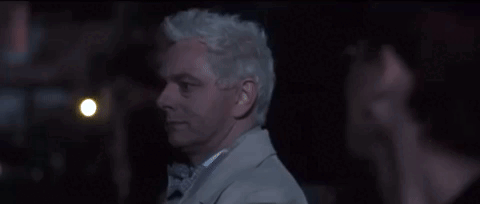
Like Aziraphale, Anne is certainly more accomplished, for one thing, and she plays by the rules of women of her time and status. BUT her sense of mortality breaks often from that of her family. When she tries to impart her good morals upon them, they are dismissive and insulting, reacting as if Anne is the one who “doesn’t get it”.
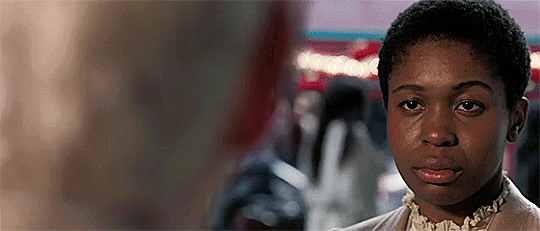
She spends eight years with a family she barely belongs to, wondering why she ever thought the company of people like this was worth the loss of Wentworth.
For all of Anne’s kindness, she is a pushover. She’s rarely confident in herself. When she needs to speak up, or just have a direct conversation with Wentworth, she doesn’t. She can’t. She repeatedly makes Wentworth come to her.
Wentworth, meanwhile, is a far better match for Crowley than Darcy is. Wentworth will never be an aristocrat like the Elliots, but he carves out a life he considers valuable using new rules. Sound familiar?
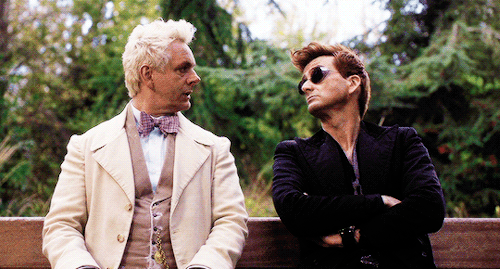
Are Wentworth’s and Crowley’s morals obviously a bit different? Yes, of course. Crowley is a DEMON, after all. But Crowley conducts himself in such a way that he’s literally cast out of Heaven and removed from Hell- in other words, he’s twice been given “the rules” for how to act and has twice decided, nah, that’s not for me. Wentworth was given the rules for what he could have as a low-born man and became a wealthy, high-ranking naval officer. And Wentworth didn’t do that for love, either. He found the consideration of one’s wealth in determining whether they should be loved abhorrent. Wentworth did it for himself initially (bitterly too, maybe), just like Crowley saves the goats and the kids for himself.
And, of course, Crowley’s confession parallels Wentworth’s position in relation to Anne far more than Darcy’s position to Lizzie. Crowley says “if they (two apparent opposites) can do it, so can we,” because he knows he and Aziraphale love each other. At the start of Persuasion, Wentworth asks Anne to be his wife despite their differing societal rank because he knows they love each other. At the end of Persuasion, he asks again because he knows they have both been in agony, that they both love each other as much as they ever did.
Darcy, meanwhile, does not know if Lizzie loves him, but arrogantly believes she will accept on the basis that what he can offer her monetarily is better than what anyone else can, not knowing what she actually values. She demolishes him.
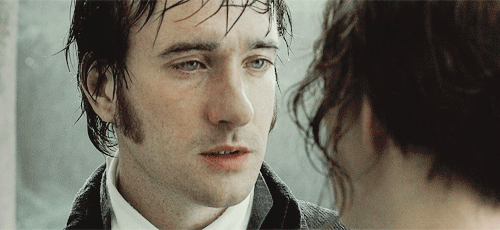
On that note, that’s really the only parallel between Aziracrow and Darcy/Lizzie, only Aziraphale is Darcy. Aziraphale believed Crowley would accept his offer because he believed Crowley would want to be an angel again. Crowley believed Aziraphale would accept his offer because he knew they loved each other.
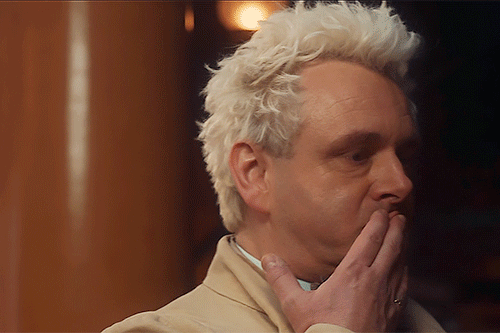
These are all very different characters, but ultimately, I think we were gunning for Pride and Prejudice and wound up with Persuasion; the slowest, most agonizing burn with the most beautiful reunion. So we didn’t get “you have bewitched me, body and soul,” in S2. We got the events leading up to Persuasion, and will have S3 to watch them play out. Neil knows that Aziraphale and Crowley’s relationship is the most compelling part of the story, so I doubt they’ll be separated for long. But everything is so messy, isn’t it? So it makes sense to keep them, like Anne and Wentworth, in close proximity, in mutual, bitter, unspoken pining, but still not together. It will be absolutely delicious to watch. Isn’t that what we loved the most from S1?

Because we know they love each other. And whatever catalyzing event forces them to say it out loud will be all the better if every moment they don’t say it hurts. I don’t want a “you have bewitched me” moment, I want “I’m half agony, half hope.”
#good omens#jane austen#meta#ineffable divorce#crowley#aziraphale#aziracrow#pride and prejudice#persuasion#im in pain#im in so much pain
773 notes
·
View notes
Text
Jealousy in Jane Austen's Works
Since I got an ask about this recently, how does Jane Austen use jealousy in her novels?
Justified Jealousy (a person has made promises to another and is now violating them):
Catherine for her brother James, when Isabella flirts with Captain Tilney (Northanger Abbey) "jealous for her brother" and James for himself.
Lucy about Edward and Elinor: "That Lucy was disposed to be jealous of her appeared very probable: it was plain that Edward had always spoken highly in her praise, not merely from Lucy’s assertion, but from her venturing to trust her on so short a personal acquaintance, with a secret so confessedly and evidently important." (Sense & Sensibility) Lucy is right that Edward has fallen for Elinor, wrong that he would betray her because of it.
Sophia Grey, about Marianne Dashwood and Willoughby (her betrothed) "and Sophia, jealous as the devil on the other hand, looking all that was" (Sense & Sensibility)
Mr. Rushworth, about Maria and Henry Crawford, "I do think that Mr. Rushworth was sometimes very jealous." (Mansfield Park)
The reactions to this justified jealousy are all different. James Morland endures for a little while, then breaks off his engagement. This was the healthiest thing to do. Lucy attacks the rival instead of addressing the issue with her fiance. Mr. Rushworth ultimately ignores the fact that his future wife loves someone else, and agrees to a doomed marriage. Sophia Grey forces Willoughby to "break up" with Marianne, unsure how that goes for her, but at least she went into marriage with her eyes open.
Manipulative (Supposed) Jealousy:
Isabella to Catherine, when Catherine refuses to break a prior engagement with another friend, "I cannot help being jealous, Catherine, when I see myself slighted for strangers, I, who love you so excessively!" (Northanger Abbey)
Isabella tries to use jealousy to guilt Catherine into breaking her engagement with the Tilneys. Catherine finds it unjust and mean, she refuses to give in.
Jealousy as a Means to Establish Boundaries:
Henry Tilney, speaking about Catherine and John Thorpe, "I consider a country-dance as an emblem of marriage. Fidelity and complaisance are the principal duties of both; and those men who do not choose to dance or marry themselves, have no business with the partners or wives of their neighbours." (Northanger Abbey)
This is a particular case. I don't think Henry is in love with Catherine yet, and I don't think he actually believes that Catherine likes John, but he does frame his opposition to John and Catherine talking in jealousy. As Catherine has agreed to be his partner, he is justified in asking her to devote her time to him. Also, once Catherine assures him of her "faithfullness", he backs off, "Now you have given me a security worth having; and I shall proceed with courage". They have established their level of commitment.
Wanting Someone Who is Interested in Someone Else:
Caroline Bingley about Elizabeth Bennet and Mr. Darcy, "Miss Bingley saw, or suspected, enough to be jealous; and her great anxiety for the recovery of her dear friend Jane received some assistance from her desire of getting rid of Elizabeth." (Pride & Prejudice)
Fanny Price, during the play about Edmund and Mary, "She was full of jealousy and agitation." (Mansfield Park)
Julia about her sister and Henry Crawford, "made even Julia admit, in her jealousy of her sister, the absolute necessity of distrusting his attentions" (Mansfield Park)
Charles Hayter of Captain Wentworth and Henrietta, "It was evident that Charles Hayter was not well inclined towards Captain Wentworth." (Persuasion)
We can assume that Colonel Brandon was jealous of Willoughby (Sense & Sensibility)
Both Colonel Brandon and Fanny Price keep their feelings to themselves. They do not pressure their object of affection or attack rivals. Colonel Brandon is even extremely hesitant to reveal what Willoughby has done to Eliza. Charles Hayter feels jealous of Captain Wentworth and quits the field, which helps Henrietta realize where her true affections lie.
Caroline Bingley and Julia both act out because of their jealousy. Julia sulks and Caroline attacks Elizabeth.
Jealousy as a Means to Realize Feelings:
Mary Crawford realizing that she loves Edmund, "She had, moreover, to contend with one disagreeable emotion entirely new to her—jealousy. His friend Mr. Owen had sisters; he might find them attractive." (Mansfield Park)
Mr. Knightley about Frank and Emma, "On his side, there had been a long-standing jealousy, old as the arrival, or even the expectation, of Frank Churchill.—He had been in love with Emma, and jealous of Frank Churchill, from about the same period, one sentiment having probably enlightened him as to the other. It was his jealousy of Frank Churchill that had taken him from the country." (Emma)
Captain Wentworth of Mr. Elliot and Anne, "Jealousy of Mr Elliot! It was the only intelligible motive. Captain Wentworth jealous of her affection!" (Persuasion)
These feelings are mostly presented as morally neutral. Mary Crawford takes no action against the Miss Owens, she just becomes more friendly to Edmund. Mr. Knightley does speak against Frank to Emma, but Emma disagrees with him about it. Captain Wentworth leaves when jealous, but does not impose his feelings upon Anne.
Other:
Emma supposes that Jane was jealous of her, but that's not completely clear from Jane's perspective, "No doubt it had been from jealousy.—In Jane’s eyes she had been a rival" (Emma)
Mrs. Elton jokes that Mr. Elton will be jealous because Mr. Woodhouse is so complimentary (Emma)
Mrs. Bennet is jealous of Charlotte Lucas's eventual position as the future mistress of Longbourn (Pride & Prejudice)
What You Don't See: No Austen hero displays possessive jealousy, like forbidding a heroine from seeing a male friend or dancing with other men at a ball. No male friendships are curtailed or challenged, which can be a common romance trope.
I ignored mentions of jealousy that didn't really relate to interpersonal relationships
Conclusion: Jane Austen shows a lot of healthy and unhealthy jealousy and reactions to it. Mr. Rushworth is stupid for ignoring that his fiance was in love with someone else, but Lucy attacking Elinor because Edward loved her was also wrong. Several main characters feel jealousy because their object of affection loves another, but they do not impose those feelings on others. Jealousy can help a person realize their true feelings. Establishing commitment can also be a healthy thing to do.
#jealousy#jane austen#meta#all the novels#I don't want to tag them all...#emma#mansfield park#pride and prejudice#sense and sensibility#northanger abbey#persuasion
144 notes
·
View notes
Text
Aziraphale was going to propose
Another Tumblr blog noted that the first time Aziraphale hears anything about Crowley having a demonic replacement on Earth is when Shax tells him herself in the Bentley on the way home from Edinburgh. He doesn't know who she is, though Crowley mentions her name earlier in the season to him. So Aziraphale knows of her, but hasn't seen her or know exactly who she is or why she's on Earth. At least, not until that moment.
And what does Aziraphale do when he gets back? Immediately starts planning the ball.
Neil has said (edit: my bad! Neil REBLOGGED someone who said they had a theory that Aziraphale was going to confess his love to Crowley and threw the ball to do it. He did not confirm or deny anything. People were SAYING that Neil confirmed it, a reblog is not a confirmation. But it sure is interesting . . . ) that Aziraphale was going to throw out his own love confession at the ball if Hell hadn't attacked.
I suspect it's even a little more than that.
This is the first Aziraphale learns that Crowley isn't answering to Hell anymore. That apparently, Hell has backed right out of Crowley's life. From what Aziraphale can see, they're free. Both of them.
I don't think he planned the ball to ask Crowley to dance or to admit his love. Crowley knows.
I think Aziraphale meant to propose.
(Even with my edit above, I still suspect this is true. Crowley and Aziraphale have been an unspoken couple for centuries. In ye olden days -- when Jane Austen was writing -- people didn't date and then move in together and then get married, they found someone they liked and they PROPOSED.)
#ineffable husbands#good omens meta#good omens 2#aziracrow#good omens#the ball#jane austen#a romantic plan
348 notes
·
View notes
Text
So Crowley saves Aziraphale's books in 1941. Because he loves him, because it doesn't matter Aziraphale has hundreds more at home, each one is cherished. Then 72 years later, Aziraphale gives up not a dissimilar amount of books to create a situation where he can invite Crowley to dance. Because he loves him, because he thinks dancing with someone is a direct pipeline to uncovering hidden feeling. Cool, cool cool cool, cool cool cool.
#you can’t leave this bookshop#season 2#good omens#2x05#1x03#the blitz#Jane Austen ball#meta#analysis#crowley#aziraphale#ineffable husbands#aziracrow#biceratops
318 notes
·
View notes
Text
LET'S TALK ABOUT THE LOKI SERIES' ROMANTIC TROPES AND JANE AUSTEN
I am going to compare the relationships and romantic undertones of Loki, Sylvie, and Mobius with my all-time favorite Jane Austen adaptation because the character archetypes and plot-points are strikingly similar with Ang Lee and Emma Thompson's 1995 Sense and Sensibility.
This sounds cracked, but stay with me. Tropes are tropes for a reason. They are often repeated in writing subconsciously because they are very old and near-universal story arcs regardless of the literary genre we are discussing.
Please note that this is not a 1-to-1 comparison. This is an analysis of basic archetypes, tropes, and plot-points: the barebones skeleton of story structure. With that said, let's dig in:
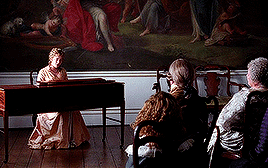
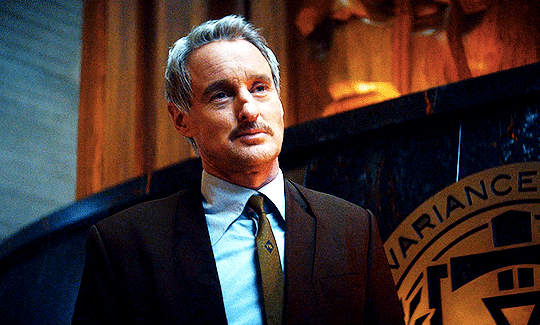
Loki = Kate Winslet's Marianne Dashwood
Sylvie = Greg Wise's John Willoughby
Mobius = Alan Rickman's Colonel Brandon
For those of you who have not seen (or read) Sense & Sensibility, the story is about a family of women who are rendered near-destitute when the patriarch passes away and, due to English law at the time, all the family finances fall to the only son. The only hope for the women to escape the edges of poverty is to marry into wealth.
The Loki series’ main storyline is a far cry from that of Sense & Sensibility. It is first and foremost a sci-fi action-adventure, but don’t let that genre fool you. Well-written stories are always character-driven. The setting serves to establish the rules of the world and the tangible challenges the characters must confront to achieve their goal. The end goal for Loki is his ascension to the God of Stories (and time). Therefore, his character arc must follow a trajectory that prepares him for that ascension.

Love, above all else, is essential for Loki’s journey. In order to understand and be capable of love, Loki must experience love in all its forms including but not limited to romantic. I've seen a lot of social media posters mocking shippers with comments saying, "the story is not about romance." I wholeheartedly disagree. While romance is not the main concern of the series, romance does serve Loki's character development.
It is critical that we remember romance does not require physical contact or even blatant declarations of love. If that were true, unrequited love would not be thought of as romantic, which we know is not the case. Further, it is possible for physical intimacy to exist without any romance at all. One does not require the other.
While dismantling HWR’s old regime is the Loki series’ “Plot A” thread, Loki’s emotional experience serves as the series’ “Plot B” thread. Love and romance exist in Plot B.
THE CHARACTERS & THEIR ARCHETYPES
LOKI & MARIANNE
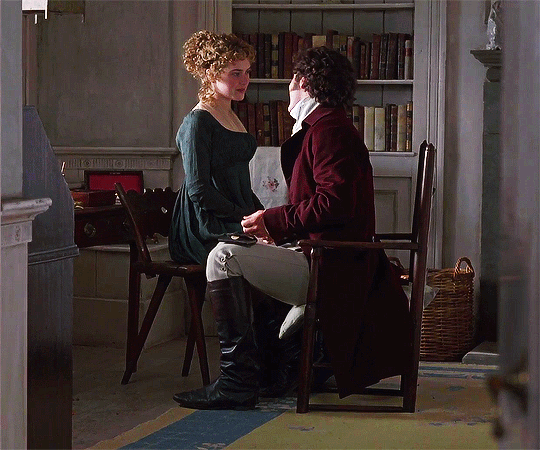
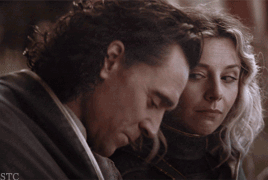
Within Sense & Sensibility’s plot, one of the main heroines, Marianne, has the archetype of the mercurial, passionate, and freewheeling spirit. She is rebellious at heart, chaffing at society’s rigid expectations of emotional repression and polite rather than fiery courtship. Much like Loki with Sylvie, Marianne is drawn to John Willoughby because his temperament, values, interests, and talents very closely mirror her own.
Like Loki, Marianne is emotional. Her emotions drive many of her decisions, some of which are rash and socially unacceptable for her era.
Like Loki, Marianne detests social norms. Refusing to contain her nature for anyone, she is unafraid of the stares and judgment of others.
Like Loki, Marianne is poetic, a lover of words and metaphor.
Like Loki, Marianne is a hedonist. She will follow where her heart takes her regardless of the consequences. Just as Loki runs after Sylvie through the portal door, Marianne chases after Willoughby.
SYLVIE & WILLOUGHBY
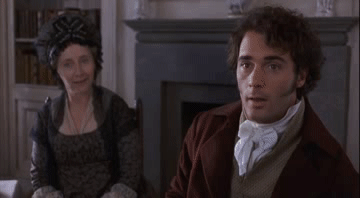
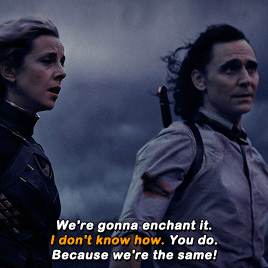
Willoughby fulfills the archetype of the ideal lover at first sight. He is young, handsome, strong, deeply romantic, and a lover of poetry, pleasure, and unfettered emotion. I will not go into the deeper details of his character and plot here as I don't find them relevant for the purposes of this analysis. The key point to remember is that Willoughby is meant to be Marianne's perfect match by virtue of similarity.
Like Sylvie, Willoughby is emotional and consequently chaotic in nature. At his worst, Willoughby is unafraid of hurting others in the pursuit of his desires.
Like Sylvie, Willoughby chooses absolute freedom over the genuine love and care he has for Marianne (Loki).
Like Sylvie, Willoughby views institutions with social authority with contempt.
Like Sylvie, Willoughby judges character based on association with institutions rather than the individuals themselves. He holds repugnance for Brandon’s (Mobius’s) association with the military (the TVA). Fair enough, both the TVA and the military (especially the British military) are institutions that have committed horrific global atrocities.
Like Sylvie, Willoughby is unable to separate the institution from the individual people living and working within it, who are capable of goodness.
MOBIUS & COLONEL BRANDON
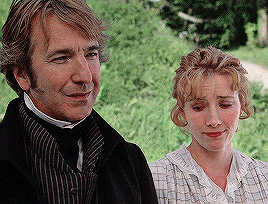

Colonel Brandon, a decorated military officer, fulfills the trope of the “dark horse” in love. He is Willoughby’s opposite: older, "less physically attractive", reserved, practical, and orderly. The main character (Loki/Marianne) appreciates his friendship yet does not feel any romantic affection for him (Mobius/Brandon) until the primary love interest (Sylvie/Willoughby) abandons the relationship for absolute freedom.
Like Mobius, Brandon is drawn to intelligent, artistic, footloose nonconformists.
Like Mobius, Brandon accepts and loves Marianne exactly as she is, including her faults. He does not want her to change against her will and gently reprimands her older sister, Elinor, at such a suggestion.
Like Mobius, Brandon serves an institution with significant influence on the lives of others.
Like Mobius, Brandon accepts that his love is not returned yet continues to express his love through his support of Marianne’s (Loki's) wishes, including his romantic rival Willoughby (Sylvie).
Like Mobius, Brandon is seen as a dear friend rather than a potential romantic partner in the first 2/3rds of the story.
Like Mobius, Brandon’s personal desires are secondary to Marianne’s (Loki’s) happiness.
THE ROMANTIC PLOT
It is understood by the audience that love is not only a feeling; it is also an action that requires incredible responsibility. In that responsibility, both lovers must choose to take into consideration the feelings, wants, and needs of the other.
The trope of a main character meeting their perfect match and falling quickly in love informs the audience that conflict must lie ahead, and that the third party of the love triangle will be tested for their worthiness as a romantic partner.
Loki & Sylvie and Marianne & Willoughby possess a fast, passionate, and explosive love.
Loki & Mobius and Marianne & Brandon posses a slow, steady, and gently burning love.
These two relationships, which are BOTH valid AND romantic, are set against one another to contrast each suitor's strengths and weaknesses, as well as to shed light on which suitor best meets the feelings, needs, and wants of the main character.

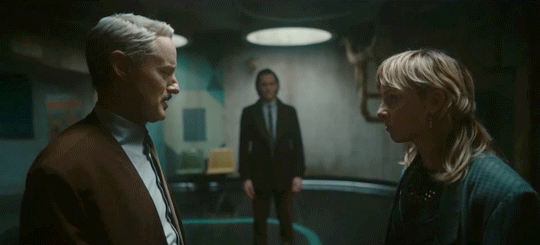
The main character's (Loki/Marianne) love interests inevitably collide in a tense confrontation. Being the Georgian Era, Brandon and Willoughby do not discuss their dislike for one another directly but with Marianne's older sister, Elinor.
Sylvie, on other hand, is not afraid to tear into Mobius, saying exactly what she thinks of him. Both directors of photography frame their shots in a near-identical fashion, demonstrating who are at odds and the individual (present or not) who is between them.
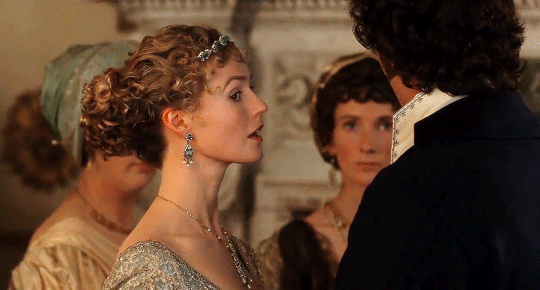
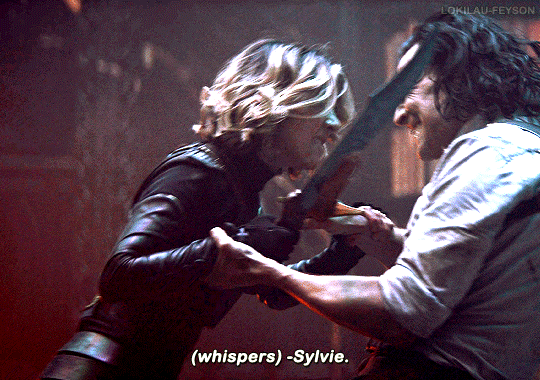
Whether in the realm of fiction or reality, the act of love inherently requires some degree of self-sacrifice.
While Sylvie performs self-sacrifice by pruning herself in hopes of finding and rescuing Loki from the Void, that self-sacrifice does not extend to her personal values and beliefs with respect to free will. She therefore fights Loki, ultimately kissing him farewell before kicking him through a time door to get what she wants.
Likewise, Willoughby, cut-off from his family's estate due to indiscretions he refuses own, prioritizes wealth over his relationship with Marianne in order to continue his lifestyle of luxury and absolute freedom. Willoughby therefore marries the exceptionally wealthy Miss Grey to achieve this end, abandoning Marianne and breaking her heart in the process.
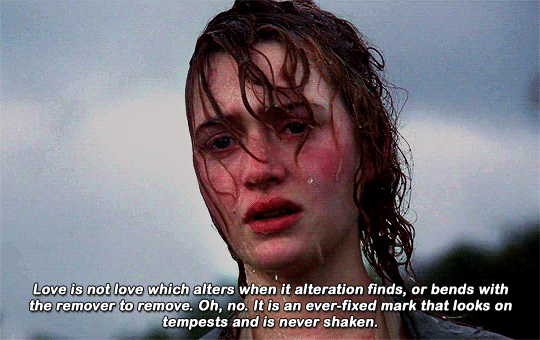

At the midpoint of each storyline (where the narrative turns), both Loki and Marianne have lost the person they felt most strongly about because they were not that's person's priority.
Marianne's quote in the above gif is significant. It is a poem she and Willoughby recited together when they first met. She recites it again, alone, as she looks upon the estate Willoughby has married into in the rain. The poem is as follows:
"Love is not love which alters when it alteration finds, or bends with the remover to remove. Oh, no. It is an ever-fixed mark that looks upon tempests and is never shaken."
This poem defines love as not fickle but persistent in the face of challenges and "never shaken".
THE DARK HORSE IN LOVE
Brandon, who falls for Marianne first, establishes himself as not only a friend of Marianne's but her whole family's. All of his actions throughout the film are performed out of love for Marianne, but these actions are not read as romantic by Marianne because there is no fast-burning fire and (seemingly) little commonality between them.

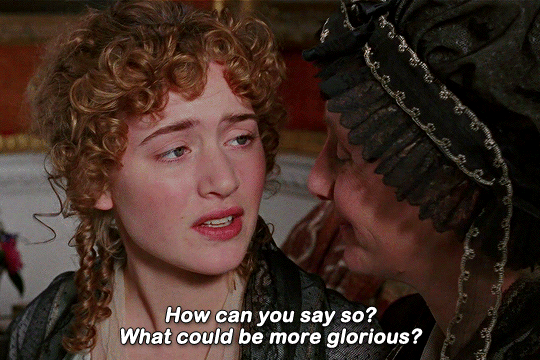
Marianne's mother cautions her, pointing out that the romances she cites all meet pitiful ends. In return, Marianne describes such love as not pitiful but "glorious."
Brandon and Mobius express their love for Marianne and Loki through practical means. Their actions are predominantly viewed as marks of friendship rather than marks of romantic love. It should be noted that in both cases, no verbal declaration of love, nor any physical declaration of love, such as a kiss, is ever made by either Mobius or Brandon on screen. Brandon's unrequited love, however, is readily apparent to everyone (the characters and the audience) due his presentation of the opposite gender.
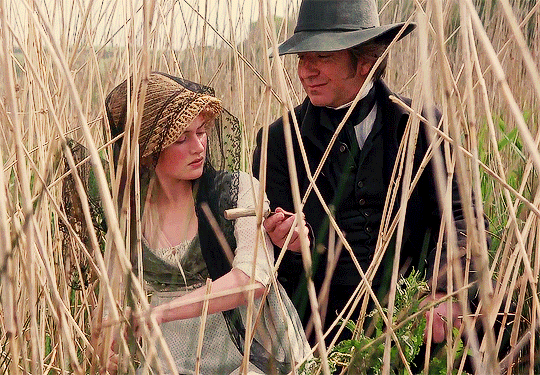

Brandon, upon seeing Marianne struggle cutting reeds for weaving, offers her his pocketknife. Mobius, knowing that confrontation with Sylvie at Roxxcart will be dangerous, offers Loki his daggers for protection.
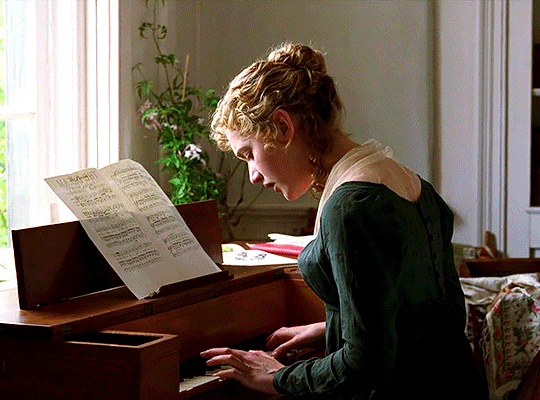
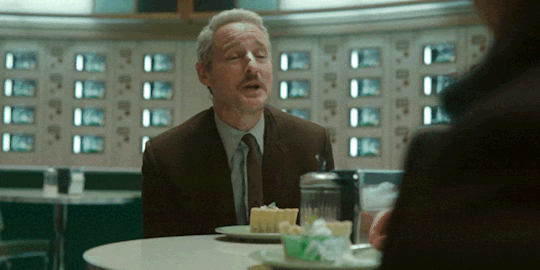
Brandon, recognizing Marianne’s need for artistic pursuits, gifts her a piano. Mobius, recognizing Loki’s need for validation, provides him with words of affirmation, encouraging Loki’s talents in magic and cunning.
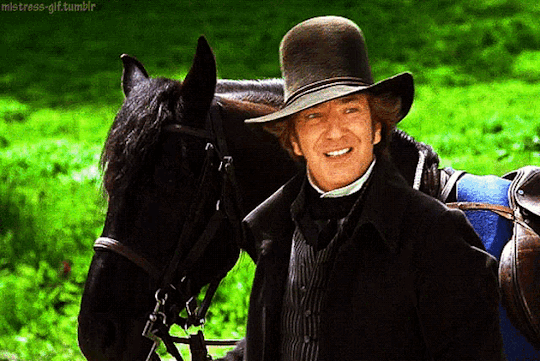

Brandon, acknowledging Marianne’s love for Willoughby, invites Willoughby to a picnic at his estate despite his distaste for him. Mobius, acknowledging Loki’s love for Sylvie, frees Loki and is pruned despite his jealousy of her.
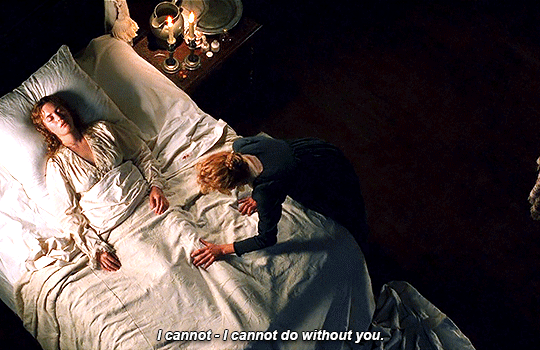

Marianne, out in the rain and in distress over her loss of Willoughby, succumbs to a deadly fever. Loki, kicked through a time door and in distress over his loss of Sylvie, succumbs to time-slipping.
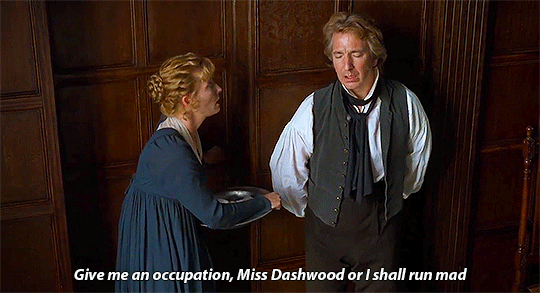

Brandon and Mobius actively make themselves available in response to their loved one's individual break-ups with ZERO expectation of having their love returned.
Brandon, concerned that Marianne's illness may kill her, rides nonstop for hours to retrieve her mother during a storm. Mobius, concerned for Loki's wellbeing, risks his life on the loom's gangway, risking exposure to temporal radiation and death.
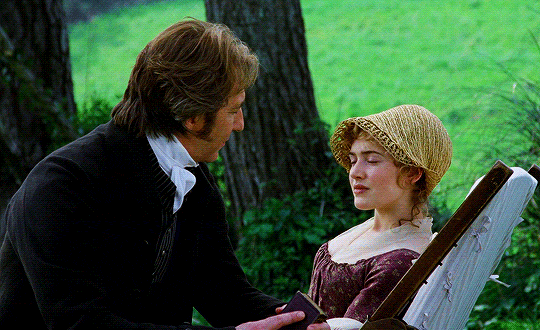
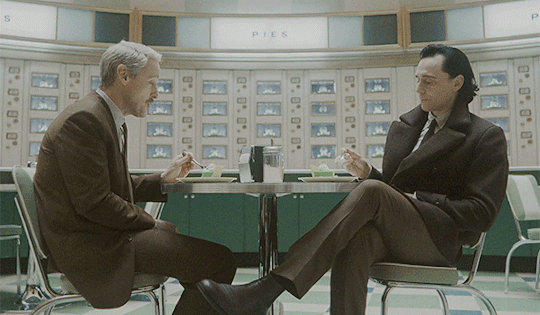
In the end, both Brandon and Mobius are the triumphant winners of Marianne's and Loki's hearts.
Indeed, Brandon reads poetry to Marianne, and when he announces he must "away", Marianne worriedly asks "where?", demonstrating her desire for him to stay. Brandon teases her, fulfilling Marianne's need for romance and excitement by saying, "it is a secret."
Mobius, meanwhile, begins to open himself up to worldly pleasures, allowing himself to drop the strict, no-nonsense behavior he exhibited in S1. Loki, in turn, begins to provide him with the type of emotional support Mobius has consistently given him since the beginning (yes, he has a jealous meltdown, but he recovers relatively quickly).
The outcome of their successes, however, diverge due to their gender presentation.
Whereas Brandon happily marries Marianne ...
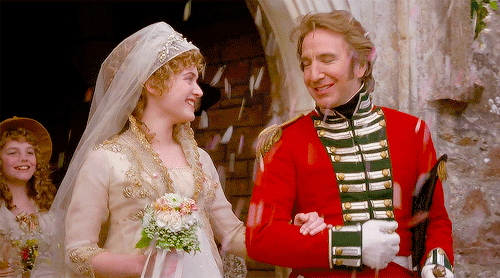
... Loki returns Mobius's selfless love with a sacrifice of his own, and they are separated.
#lokius#loki#mobius#loki series#loki season 2#lgbt representation#lgbtqia#queer representation#lgbtqia representation#loki meta#loki analysis#my meta#my analysis#jane austen#sense and sensibility
206 notes
·
View notes
Text














Bonus: (very important 'us' and old married couple moments)



We. Us. Our.
[Pt. 10/12] [Pt. 1] [Pt. 2] [Pt. 3] [Pt. 4] [Pt.5] [Pt. 6] [Pt. 7] [Pt. 8] [Pt. 9] [Pt. 11] [Pt. 12]
Good Omens | 2.05 The Ball
#good omens#is there a version of this where we don't obsess over the ball#that conversation with nina though#good omens 2#good omens meta#ineffable husbands#aziracrow#aziraphale#crowley#david tennant#michael sheen#ineffable idiots#my edits#we us our#good omens edits#the ball#good omens the ball#jane austen#pride and prejudice
139 notes
·
View notes
Text
i need to rewatch clueless but i’ve been thinking about the mrs bates/box hill moment interpretation that could’ve been a lot more (it’s a great adaptation regardless)
mrs bates is poor during the events of emma but she was still a part of the community and was richer in the past—obviously knightleys point is that emma has/should have the kindness and common sense to be polite and not punch down on her
with clueless, that moment seems to be when josh calls out cher’s interaction with lucy (“you know i don’t speak mexican,” arguably worse than the original box hill scene lol) and obvious racism aside it feels different since lucy works for cher and there isn’t that social expectation, and the only person that saw the interaction was josh. cher seems troubled after the scene but the impact doesn’t feel the same either
although clueless is great because of/despite its differences to the source material, i can’t help but wonder what a real Clueless version of box hill would’ve looked like
maybe something with amber? maybe something about her losing popularity and cher going too far in front of everyone? because i think that’s what makes box hill awful- it’s sooo public and unnecessary, sure knightley’s there but so is everyone else
14 notes
·
View notes
Text
damn we really don't think enough about the major world events that crowley and aziraphale have witnessed on both ends. all the horrible things like wars, discrimination, natural disasters, genocide, etc. yes but also all the good: liberation, major political reforms, the invention of new genres and materials and technology and fields of study.
like oh my god. they were there for all the centuries that women had no rights at all and then they got to witness the suffragettes, the women writers and royals and inventors and activists. they got to witness the overturning of anti-lgbtq and racial segregation laws and the celebration of human rights and identities. they were there to witness international tragedies but also the solidarity from everyone all over the world rallying for peace for people they don't even know. they got to see humans create new forms of art and fashion and the printing press and electricity and poetry and and and coloured television and music and they got to see humans constantly find new ways to find connection and love and fun and passion and their own forms of expression.
like imagine being there for everything. how could you not love the world after seeing the fall and rise of humanity over and over again in every way shape and form for six thousand years. holy shit
#fearandhatred#fearandmeta#and they didn't just witness all this they got to KNOW people from all these times. shakespeare and da vinci and jane austen#and just random people on the street or working as doctors or baristas or shopkeepers like how many STORIES have they heard#imagine knowing intimately how the world has existed from the beginning of time#I'M FINE#it's just#like do you get it. do you get it#it's so incomprehensible#it's like in their heads is an incredibly massive and infinite history book with thousands of personal experiences and forgotten dynasties#like is this blowing anyone else's mind rn#i don't think this post is even about good omens anymore#good omens#good omens season 2#ineffable husbands#aziracrow#crowley#aziraphale#good omens meta
187 notes
·
View notes
Note
hi sorry if this is a silly question but is lizzie in pride and prejudice canonically pretty? i know she's not as pretty as jane, who is very beautiful, but she's described as bright-eyed and having a pleasing figure i think, but darcy at the very beginning says she's not handsome enough to tempt him (lol) right? was he 100% being a snob or is she really just "cute" but not really pretty? thanks :]
No problem!
Elizabeth is canonically pretty. She's generally considered the second most attractive of the Bennet sisters, all of whom are narratively described as pretty/handsome except Mary. Elizabeth is described as "Mrs Collins's pretty friend" and even Darcy himself very quickly realizes that she's attractive. She's not a striking classic beauty like Jane (or Darcy himself!), but she's good-looking enough.
I think Darcy's initial insult sometimes gets weighted a bit too heavily in discussions of Elizabeth's canonical appearance, tbh. Only a few scenes later, he admits that he never dances at all when he can avoid it. He particularly dislikes dancing with strangers. He's in a bad mood. And he's already a fish out of water in Meryton, a backwater village he's never been to before when he's used to far more elite and/or urban environments. He's behaving poorly that night, but IMO it's a perfect storm of factors that have almost nothing to do with Elizabeth at first. She could have been Jane's identical twin and he'd have still come up with a reason to be an asshole about it.
In fact, Darcy shows no interest in dancing with Jane either despite his mention of her; he doesn't actually want to dance with anyone, and the only reason Elizabeth comes up at all is because Bingley brings her up. I think Darcy's annoyance is primarily with Bingley, rather than Elizabeth. In Darcy's view, Bingley immediately pursues the only vaguely high status woman in the room and then publicly tries to peer pressure Darcy—who he's got to know hates dancing and who admits to being in a poor frame of mind—into dancing with a much less attractive reject.
In the moment, the whole thing reads to Darcy as just kind of insulting. He's lashing out at Bingley to make that clear and to get him to back off. I suspect he realizes it was shitty and his private insistence that Elizabeth is objectively undesirable is a weak attempt to justify his behavior.
Elizabeth isn't strikingly beautiful or anything, but Darcy's main priority is defending himself. It doesn't seem to take more than a few days for him to decide Elizabeth is actually pretty and cool and charming; he was just too annoyed to see past her unconventionality initially. He finds this deeply embarrassing (not the only thing he should!), but he was never being objective about Elizabeth's appearance. He just didn't want to dance with a stranger and was aggravated with Bingley.
#anon replies#respuestas#austen blogging#austen fanwank#elizabeth bennet#fitzwilliam darcy#long post#anghraine's meta#pride and prejudice#jane austen
71 notes
·
View notes
Text
Did you know that Fitzwilliam Darcy’s character in Pride and Prejudice is so minor, he doesn't warrant a single mention in the Wikipedia article header?

#idk what it is but the online Jane Austen discourse can be straight up idiotic#jane austen#pride and prejudice#mr darcy#meta#Wikipedia
16 notes
·
View notes
Text
Thinking about how we view and judge Austen characters and their relationships.
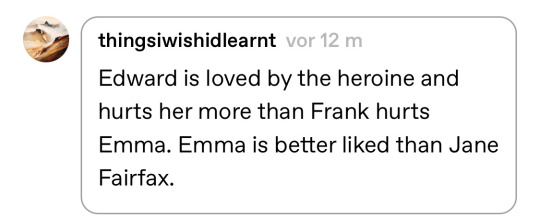
@thingsiwishidlearnt commented this under @thatscarletflycatcher’s post on judgements of Edward Ferrars vs Frank Churchill, and I think it’s a great point that relates to the way we are led to view characters (initially).
Most of the time, we see characters only from the heroine’s biased perspective, so our first instinct is to also judge them from that perspective. The heroine’s thoughts and feelings about them, and their behaviour towards her and those close to her seems more relevant than the actual entirety of their actions, their (or others’) perspective and feelings, or the information they have available.
We know Emma doesn’t care about Frank, but he couldn’t have truly known that. We also get way less insight into Jane’s than Elinor’s feelings, making it easier to dismiss the pain Frank causes than the one Edward causes.
Sometimes, the narrative explicitly invites us to question this approach:
Mr Darcy is a jerk for separating Jane and Bingley because we know that Jane truly liked him, and we see Jane heartbroken. Then we get the letter and his perspective and are reminded that he didn’t have the same insight.
Sometimes, things might become more obvious on a reread:
Mr Darcy is arrogant for assuming Elizabeth would marry him because we know what she thinks of him. But if you go back and read P&P knowing the proposal is coming, there are so many obvious flirting attempts that Lizzy just misses.
I also think it’s tempting to “devalue” the parts of the story into which we have less immediate insight:
Marianne truly loved Willoughby but not Brandon because we get to witness all of her relationship with and love for Willoughby, while her love for Brandon is summarised in one sentence.
In a way, I think this is a natural reaction because the novels are written in a manner that invites us to fall for the biased perspective. But recognising it and looking beyond it can be so interesting!
#I also think Frank being so charming plays into the whole Frank vs Edward thing#’Boring’ Austen guys always get a much harder time#meta#readings#jane austen
70 notes
·
View notes